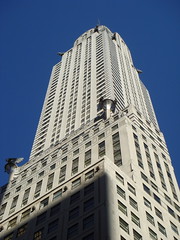
Chrysler Building in New York NY
Our Gallery
Hours: April-October: |
Back to Issue 4
 New York City is surrounded by harbors, bays, rivers and more, making it one of the most important ports in the country. A visit to the South Street Seaport Museum will show you the vast history with galleries and historic ships docked right there. Located on the site of what was once America’s leading port of call, the now historic twelve-square-block district in lower Manhattan.
New York City is surrounded by harbors, bays, rivers and more, making it one of the most important ports in the country. A visit to the South Street Seaport Museum will show you the vast history with galleries and historic ships docked right there. Located on the site of what was once America’s leading port of call, the now historic twelve-square-block district in lower Manhattan.
South Street Seaport Museum offers you an unforgettable glimpse into the lives of the people who lived in the 18th- and 19th-century New York. The museum was founded in 1967 to trace the history of the Port of New York, and its commercial and cultural impact on the city, the state and the nation. Its first goal was to save eleven blocks of historic buildings around the Brooklyn Bridge from being leveled by developers.
After securing the buildings, they started bringing in historic vessels and established a maritime museum and research library. In the 1980s, the Museum undertook a $286 million dollar project to restore and revive the Seaport so it was on par to similar historic locations as Baltimore’s Harbor Place and Boston’s Quincy Market. Together with the Rouse Company and the City of New York, the area has become a place of culture and commerce, featuring entertainment, learning, restaurants, shopping and vessels you will never see anywhere else in the world.
One the more majestic exhibits on display is “Monarchs of the Sea: Celebrating the Ocean Liner Era.” This permanent exhibition features plans, models and memorabilia from the  exciting age when ocean liners ruled the sea lanes. Before airplanes and jets came along, ocean liners were the last world in luxury travel, and this exhibit has the best of what that age had to offer.
exciting age when ocean liners ruled the sea lanes. Before airplanes and jets came along, ocean liners were the last world in luxury travel, and this exhibit has the best of what that age had to offer.
After view the museum’s galleries of galleys, step outside where the true adventure is! The South Street Seaport Museum is the home of the nation’s largest fleet of privately maintained historic vessels. Their dock holds ships that once filled New York Harbor - cargo and working vessels that moved both people and freight.


Peking:
Rig: Four-masted barque
Material: Wood decks and rest steel
Length: 377 ft.
Breadth: 47 ft.
Gross Tonnage: 3100
Net Tonnage: 2883
Depth: 26 ft. 3 in.
Main Mast Height: 170 ft.
Sail Area: 44,132 sq. ft.
Max Speed: 16.5 knots (19 mph)
Passenger Capacity: 200
This incredible ship represents the final chapter in merchant vessels powered by wind. The four-masted barque Peking was launched in 1911, from Hamburg, Germany and sailed to South America around the storm-tossed Cape Horn. In 1932, she moored in England’s Medway River where she served as Arethusa Boy’s School for 40 years. In 1975, she was acquired by the museum. Her steel hull is as long as a football field and she has masts as tall as an 18-story building. After a twelve year restoration project, the wire rope riggings were fully restored to original condition. Visitors can also go below decks to tour living quarters, view vintage photos of her career and watch “Peking at Sea,” a stomach-turning film about it’s trip around Cape Horn
 Ambrose:
Ambrose:
Length: 112 ft. 12 in.
Breadth: 29 ft.
Depth of Hold: 15 ft. 4 in.
Gross Tonnage: 488
Since you could not build a lighthouse on water, back in the day they had lightships. The Ambrose was built in 1908 for this purpose and sat in the mouth of lower New York Bay between Coney Island and Sandy Hook, New Jersey. She would guide approaching ships away from the sand bars and shoals until 1963, and was given to the museum by the U.S. Coast Guard in 1968. Today, visitors can board the Ambrose to view an exhibition of photographs, charts, and artifacts on navigation and the forgotten role of lightships.



| Jobs | 5 | Real Estate - Sale | 0 | |
| Real Estate - Rent | 0 | Buy / Sell / Trade | 0 | |
| Personals | 0 | Automotive | 0 | |

| Daily Poll | ||
|